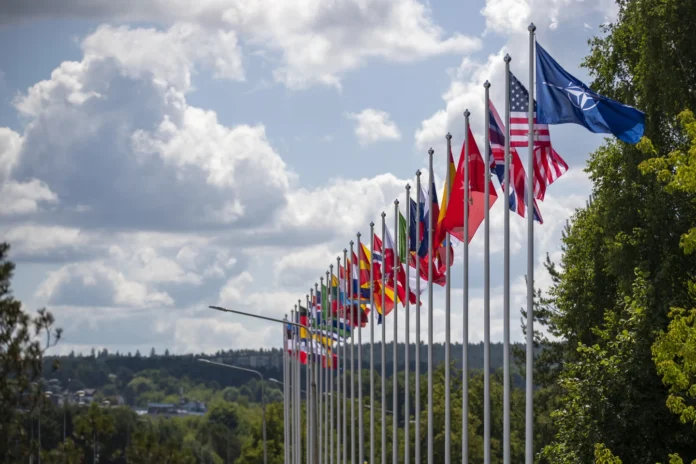WASHINGTON (AP)-As the Russian invasion of Ukraine continues, NATO is facing fresh strains as leaders gather for their annual summit in Vilnius, Lithuania. The alliance is struggling to reach an agreement on admitting Sweden as its 32nd member, and member nations are falling behind on military spending goals. Compromises over NATO’s next leader could not be reached, leading to an extension of the current secretary-general’s term.
The question of how Ukraine should be integrated into NATO is one of the most difficult issues. Some argue that admitting Ukraine is necessary to deter Russian aggression in Eastern Europe, while others fear it could provoke a wider conflict. President Joe Biden stated that he does not believe Ukraine is ready for NATO membership, emphasizing the need for countries to meet various qualifications.
Maintaining solidarity within NATO is crucial, as divisions can be exploited by Russian President Vladimir Putin, who is facing challenges at home. The war in Ukraine has reinvigorated NATO, with members providing military assistance to Ukraine and Finland becoming NATO’s 31st member. However, challenges remain, such as the recent decision by the United States to provide cluster munitions to Ukraine, a weapon banned by most alliance members.
The focus on Ukraine’s entry into NATO varies among member states. The U.S. and Germany prioritize supplying weapons and ammunition to Ukraine, while countries on NATO’s Eastern flank seek firmer assurances on future membership. Ukrainian President Volodymyr Zelenskyy is pushing for an invitation to join the alliance.
The summit will also address Turkey’s opposition to Sweden’s membership in NATO due to disagreements over anti-Islamic demonstrations and Kurdish insurgency. Turkish President Recep Tayyip Erdogan has used NATO summits in the past to secure concessions for Turkey. Frustration is growing among allies toward Erdogan, with concerns over his ties to Putin and democratic backsliding.
Hungary’s prime minister, Viktor Orban, is also delaying Hungary’s approval of Sweden’s membership, leading to the blocking of a $735 million U.S. arms sale to Hungary. Despite these disagreements, NATO members believe the alliance remains strong and successful.
The summit will not address the selection of a new NATO leader, as members agreed to extend the tenure of Jens Stoltenberg for another year. Disagreements may arise over NATO’s updated plans for countering a potential Russian invasion, which could cause tension and dissent among member states.
Overall, NATO faces challenges in maintaining unity and addressing key issues such as Ukraine’s integration and member states’ military spending. The summit aims to demonstrate harmony among members and deter further Russian aggression.
The upcoming NATO summit in Vilnius, Lithuania takes place amidst the ongoing Russian invasion of Ukraine, presenting new challenges to the unity of the alliance. One of the contentious issues is the admission of Sweden as NATO’s 32nd member. The alliance is also facing difficulties in achieving its long-standing military spending goals, and disagreements over the selection of NATO’s next leader have led to an extension of the current secretary-general’s term.
One of the most pressing matters is the question of how Ukraine should be integrated into NATO. Some argue that granting Ukraine membership is necessary to deter Russian aggression in Eastern Europe, while others are concerned that it could escalate the conflict further. President Joe Biden expressed his belief that Ukraine is not yet ready for NATO membership, emphasizing the need for countries to meet certain qualifications.
Maintaining solidarity within NATO is crucial, as divisions can be exploited by Russian President Vladimir Putin, who is currently dealing with challenges both domestically and in Ukraine. The war in Ukraine has served as a rallying point for NATO, with member nations providing military support to Ukraine. Additionally, Finland recently became NATO’s 31st member.
However, challenges remain. The United States’ recent decision to provide cluster munitions to Ukraine has caused friction within the alliance, as many member nations have banned these weapons due to their high civilian casualty rates. The focus on Ukraine’s integration into NATO varies among member states, with the U.S. and Germany prioritizing the supply of weapons and ammunition, while Eastern flank countries like Estonia, Latvia, Lithuania, and Poland seek stronger assurances on future membership.
Ukrainian President Volodymyr Zelenskyy has been pushing for a formal invitation to join NATO, and during a visit to the Czech Republic, he stated that an invitation would be the ideal outcome of the summit. However, NATO could also opt to elevate its relationship with Ukraine by establishing the NATO-Ukraine Council and granting Kyiv a seat for consultations.
Another topic of discussion at the summit will be Turkey’s opposition to Sweden’s NATO membership bid. Turkish President Recep Tayyip Erdogan accuses Sweden of being too lenient on anti-Islamic demonstrations and militant Kurdish groups. Disagreements between Turkey and the United States over the sale of F-16 fighter jets further complicate the situation.
Overall, while disagreements and challenges persist within NATO, members remain committed to the alliance’s strength and success. The summit aims to demonstrate unity and deter further Russian aggression, while also addressing key issues such as Ukraine’s integration and military spending goals.






